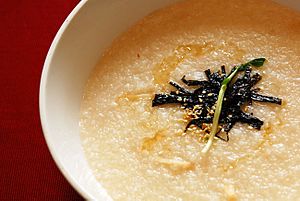Jeonbok-juk facts for kids

Jeonbok-juk made without the abalone's internal organs
|
|
| Type | Juk |
|---|---|
| Place of origin | Korea |
| Serving temperature | warm |
| Main ingredients | Abalone, rice |
| 58 kcal (243 kJ) | |
| Korean name | |
| Hangul |
전복죽
|
|---|---|
| Hanja |
全鰒粥
|
| Revised Romanization | jeonbok-juk |
| McCune–Reischauer | chŏnbok-chuk |
| IPA | [tɕʌn.bok̚.t͈ɕuk̚] |
Jeonbok-juk (전복죽; 全鰒粥), also called abalone rice porridge, is a special kind of Korean porridge. It is made with delicious abalone and white rice. Abalone is a type of sea snail that Koreans consider a very fancy ingredient. In the past, it was often given as a gift to the king of Korea.
This tasty dish is a local favorite from Jeju Island. Abalones are often found and collected there. Jeonbok-juk is known for being not only a yummy meal but also a healthy one. It can help people who are sick or elderly feel better and digest their food easily. You can make Jeonbok-juk with or without the abalone's internal organs. If you use the organs, the porridge will have a green color. If not, it will be more ivory, like a light cream color.
Contents
How to Make Jeonbok-juk
Making Jeonbok-juk involves a few steps to get it just right. It starts with carefully preparing the abalones and rice.
Preparing Abalone and Rice
First, the abalones need to be very clean. People usually scrub them with a brush in water. Then, they carefully take the abalone meat out of its shell using a small kitchen knife. The abalone's internal organs are removed separately. It's important to be gentle so they don't get damaged.
Next, the abalone meat is lightly cooked in boiling water for a short time. This is called parboiling. After that, the meat is sliced into thin pieces. For the rice, it needs to soak in water for about 3 to 4 hours before cooking. This makes the rice softer and easier to cook into a porridge.
Cooking the Porridge
Once the abalone and rice are ready, the cooking begins! The sliced abalone meat is stir-fried in a pot with sesame oil over a medium heat. Stir-frying means cooking quickly while mixing the ingredients. After a little while, the soaked rice is added to the pot.
The abalone and rice are stir-fried together for some time. Then, water is poured into the pot, and the heat is turned up. It's important to keep stirring the mixture often. This stops the ingredients from sticking to the bottom of the pot. Once the dish starts to boil, the heat is turned down. The porridge is then left to simmer, which means it cooks slowly at a low heat. Finally, the Jeonbok-juk is seasoned with salt or ganjang (which is Korean soy sauce) to give it flavor.
Images for kids
See also
 In Spanish: Jeonbokjuk para niños
In Spanish: Jeonbokjuk para niños
 | Sharif Bey |
 | Hale Woodruff |
 | Richmond Barthé |
 | Purvis Young |


